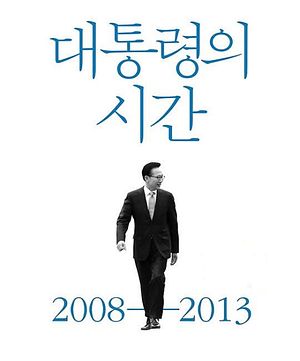Lee Myung-bak, the former South Korean president, might be one of few whose policy towards North Korea caused major controversy. Some say his policies had a positive effect on the world’s most isolated country, while others claim the inter-Korean relationship hit gridlock under his administration.
Two years after his term ended, amidst an ongoing dispute over his policy toward North Korea, the former president explained what happened between North and South and how he dealt with North Korean issues in a recently released autobiography. The title of Lee’s memoir could be translated into English as Time as President; the book does not yet have an official English title.
In the book Lee said North Korea requested an inter-Korean summit at least five times, but South Korea had to refuse because there were always preconditions for holding the talks.
The first request from North Korea was made after high level officials from Pyongyang visited South Korea in order to consult with former President Kim Dae-jung, who maintained a good relationship with the North. Lee explained in the book that after the officials returned to Pyongyang, North Korea requested a summit – but only if Seoul would provide rice and fertilizer. South Korea refused.
Lee added that when he participated in the China-Japan-South Korea trilateral summit in 2010, then-Chinese Premier Wen Jiabao told him that Kim Jong-il, then the North Korean leader, wanted to hold talks with South Korea. Wen carried same message again when an ASEAN+3 meeting was held. However, the idea of a summit foundered in November as Pyongyang requested corn, rice, fertilizer and $10 billion for its plan to establish the Development Bank.
The sinking of the South Korean Navy corvette Cheonan in July 2010 was followed by South Korea demanding an apology and making efforts to prevent the recurrence of accidents. Pyongyang once again demanded 500,000 tons of rice for fulfilling South Korea’s request, Lee said in the book.
In 2011, Wen suggested again that it would be good if Lee could hold a summit with North Korea when Wen met Lee at the China-Japan-South Korea trilateral summit in 2011. Four days after the suggestion was made, Wen had lunch with Kim Jong-il, who was visiting China. After the lunch, Kim abruptly went back to North Korea. Lee explained that might have because Wen carried Lee’s message to Kim that there would not be an inter-Korean summit without an apology from North Korea for the sinking of the Cheonan. As Lee recalls, that moment was the last chance for an inter-Korea summit under his administration.
Lee recounts a specific conversation with Wen regarding the current North Korean leader Kim Jong-un. Wen told Lee in a 2012 summit between South Korea and China that he had very little knowledge about Kim Jong-un. Still, Wen said people should wait and see how North Korea would change. North Korea had dramatically increased inflammatory rhetoric toward South Korea at that time as Pyongyang gradually transferred power to Kim Jong-un.
Lee answered that he and Wen were old and about to retire, but someone very young had just seized power in the North. Kim’s time in power will likely continue for 50 or 60 more years — a worrisome thought, Lee told Wen. Wen replied, “That’s not how history works.” Lee wrote that he understood Wen to be implying that there was no need to worry about the dictatorship in North Korea being continued that long.
Lee’s policy toward North Korea is still controversial in South Korea. While Lee barely explained the details of his thoughts on North Korea and what happened between the two Koreas during his term, Lee’s thoughts are included in the book, making them open to the public for the first time. Accordingly, the release of this book is expected to open a new chapter in the ongoing controversy over Lee’s inter-Korean policy.

































